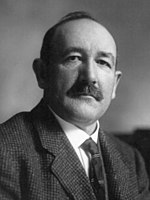Portal:Oregon/Selected biography/51
Homer Calvin Davenport (March 8, 1867 – May 2, 1912) was a political cartoonist from the United States. He is known for drawings satirizing figures of the Gilded Age and Progressive Era, most notably Ohio Senator Mark Hanna. Although he had no formal art training, he became one of the highest paid political cartoonists in the world. Davenport also was one of the first major American breeders of Arabian horses and one of the founders of the Arabian Horse Club of America. A native Oregonian, Davenport developed interests in both art and horses as a young boy. Once grown, he first wandered from job to job, then worked for several West Coast newspapers, including the San Francisco Examiner, owned by William Randolph Hearst. In 1893 he married his Daisy, with whom he had three children. When Hearst obtained the New York Morning Journal in 1895, money was no object in his attempt to establish the Journal as a leading New York newspaper, and Hearst moved Davenport east in 1885 to be part of one of the greatest newspaper staffs ever assembled. Working with columnist Alfred Henry Lewis, Davenport created many cartoons in opposition to the 1896 Republican presidential candidate, former Ohio governor William McKinley, and Hanna, his campaign manager. McKinley was elected and Hanna elevated to the Senate; Davenport continued to draw his sharp cartoons during the 1900 presidential race, though McKinley was again successful. In 1904, Davenport was hired away from Hearst by the New York Evening Mail, a Republican paper, and there drew a favorable cartoon of President Theodore Roosevelt that boosted Roosevelt's election campaign that year. Davenport's later years were marked by fewer influential cartoons and a troubled personal life; he dedicated much of his time to his animal breeding pursuits, traveled widely, and gave lectures. He was a lifelong lover of animals and of country living; he not only raised horses, but also fancy poultry and other animals. He was a founding member of the Arabian Horse Club of America. He died in 1912, of pneumonia contracted after going to the docks of New York City to watch and chronicle the arrival of survivors of the Titanic.

